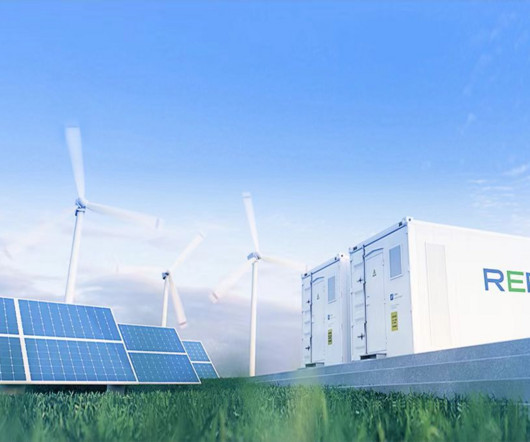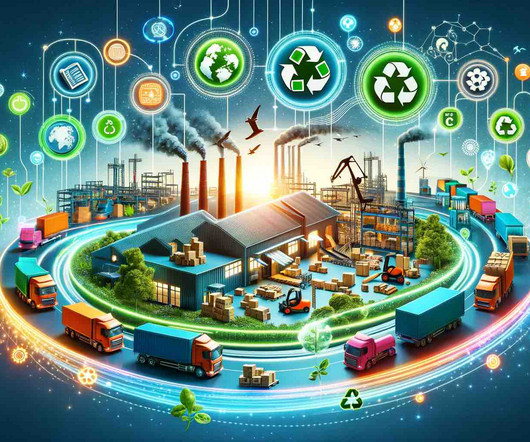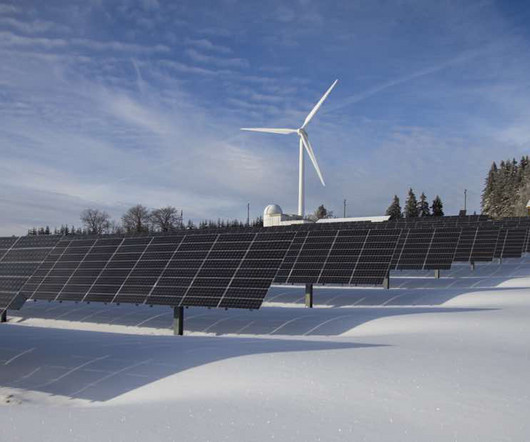Reaching Ambitious Carbon Goals with Cost-Efficient Energy Storage - SPONSOR CONTENT FROM REPT Battero
Harvard Business
APRIL 12, 2024
Sponsor content from REPT BATTERO.
This site uses cookies to improve your experience. To help us insure we adhere to various privacy regulations, please select your country/region of residence. If you do not select a country, we will assume you are from the United States. Select your Cookie Settings or view our Privacy Policy and Terms of Use.
Cookies and similar technologies are used on this website for proper function of the website, for tracking performance analytics and for marketing purposes. We and some of our third-party providers may use cookie data for various purposes. Please review the cookie settings below and choose your preference.
Used for the proper function of the website
Used for monitoring website traffic and interactions
Cookies and similar technologies are used on this website for proper function of the website, for tracking performance analytics and for marketing purposes. We and some of our third-party providers may use cookie data for various purposes. Please review the cookie settings below and choose your preference.

Harvard Business
APRIL 12, 2024
Sponsor content from REPT BATTERO.

Harvard Business
FEBRUARY 19, 2025
Sponsor content from ENEL.
This site is protected by reCAPTCHA and the Google Privacy Policy and Terms of Service apply.

Harvard Business
JULY 4, 2024
As artificial intelligence (AI) becomes increasingly ubiquitous in business and governance, its substantial environmental impact — from significant increases in energy and water usage to heightened carbon emissions — cannot be ignored. By 2030, AI’s power demand is expected to rise by 160%.

Harvard Business
JUNE 11, 2024
The article advocates for a societal movement toward reducing consumption and over-production, while embracing values of care and redistribution, challenging traditional market-first ideologies.

Clarity Consultants
MARCH 12, 2025
A well-designed custom eLearning course allows for targeted learning, ensuring employees gain the right skills at the right time, thus enhancing efficiency. Deeper insights require examining financial metrics, employee engagement, and operational efficiencies. But how do you measure its success?

Harvard Business
SEPTEMBER 25, 2024
We all have scores of decisions to make every day, and we often want to move quickly, telling ourselves that speed equals efficiency. But true efficiency sometimes requires slowing down, being mindful, and especially looking back at the decisions we’ve made that didn’t go as we’d hoped.

Epicflow
DECEMBER 20, 2024
At present, AI is leveraged by pharmaceutical companies for the following purposes: Identifying potential drug targets and validating them; Improving clinical trial s efficiency (e.g., The rapid progress of the COVID-19 vaccine development is also associated with the use of AI-driven analytic s. with used syringes or needles).

Harvard Business
APRIL 17, 2017
It means energy turning point. (We In this transformation, we are witnessing the decarbonization of power consumption, thanks to the large-scale deployment of renewable energy sources such as wind and solar. In 2016, renewable, intermittent energy sources contributed more than 30% to gross electricity generation.

Consulting Matters
OCTOBER 10, 2024
Your joy: If your business doesn’t bring you joy, it will drain the energy you need to be fully present with your kids. If your work doesn’t bring you joy, it will drain your energy, and that energy drain will spill over into your personal life. Efficiency is the name of the game here.

Tom Spencer
OCTOBER 11, 2024
Companies are adopting various strategies to make their logistics more efficient and environmentally friendly. Amazon , for example, uses algorithms to determine the most efficient delivery routes for its drivers, minimizing travel distances and time.

Tom Spencer
JANUARY 14, 2022
Energy transitions occur from time to time, due to the discovery of new energy sources such as coal or due to policy changes, such as France’s embrace of nuclear energy. Energy transitions have occurred throughout history, from burning wood to coal, then oil and natural gas. Background.

Tom Spencer
JULY 14, 2023
Government incentives for investment into renewable energy sources, such as subsidies and tax credits , are becoming an increasingly popular way for governments to meet national pledges to reduce greenhouse gas emissions. Secondly, renewable energy is naturally occurring and based on resources that are continually replenished.

Harvard Business
MAY 22, 2018
The German sociologist Max Weber famously praised bureaucracy’s rationality and efficiencies. The energy, commitment, and collaboration among team members was a revelation. Its hierarchical authority, specialized division of labor, and standard operating procedures enabled companies to grow far larger than they had ever been.

Epicflow
MAY 31, 2022
digital twin and digital thread, the introduction of new propulsion systems and alternative energy sources, etc.). Therefore, ensuring remote teams’ efficiency will require additional effort. . Read more: 4 Tips on How to Manage Globally Distributed Teams with Maximum Efficiency. Lack of resources.

Clarity Consultants
NOVEMBER 3, 2021
Ideally, companies want to dedicate a significant amount of time, attention, and energy to the earliest stages of the project’s development, ensuring a reliable roadmap is in place that can guide everyone toward an ideal outcome. If the initial plan for a project is poor or underdeveloped, the chances of success drop dramatically.

Harvard Business
NOVEMBER 25, 2016
Consider Apple, hardly a byword in the energy business. This summer, the company applied for federal licenses to sell directly to customers the excess renewable energy it generates on its new campus and in facilities across Oregon, Nevada, and California. But solar electricity is only the beginning of the future energy marketplace.

Harvard Business
MARCH 1, 2017
Business leaders often think of “efficiency” and “productivity” as synonyms, two sides of the same coin. When it comes to strategy, however, efficiency and productivity are very different. Efficiency is about doing the same with less. The benefits from improving efficiency appear to have petered out.

Harvard Business
MARCH 23, 2017
In New York state, neighbors are testing their ability to sell solar energy to one another using blockchain technology. In Austria, the country’s largest utility conglomerate, Wien Energie, is taking part in a blockchain trial focused on energy trading with two other utilities. Distributed Database.

Harvard Business
SEPTEMBER 12, 2014
Most companies are unprepared for the emerging revolution in predictive energy analytics. In fact, many readers’ eyes will have already glazed over at the preceding sentence, with the natural initial reaction that energy-related data isn’t relevant to their jobs. alone, according to the US.

Epicflow
DECEMBER 14, 2023
While the complexity of construction projects is increasing, digitalization provides construction companies with a number of benefits: high efficiency of processes, precise project planning and visualization, real-time cooperation, new market opportunities, reduced risks, more effective decision-making, optimized construction costs, etc. [5;

Epicflow
JUNE 10, 2022
For example, currently, the A&D industry is facing increasing geopolitical and economic uncertainty as a result of the Russia-Ukraine war, energy and raw materials challenges due to the sanctions imposed on Russia, inflation rate, etc. Volatility in the geopolitical and economic environment. . Managing the supply chain. Conclusion.

Tom Spencer
OCTOBER 25, 2024
Environmental Metrics: These measure a company’s impact on the planet, including emissions, energy efficiency, waste management, water usage, and sustainability of the supply chain. ESG metrics provide a framework for evaluating business performance along three dimensions.

Steve Shu Consulting
JULY 25, 2014
For example, Opower tapped into a great market using software-as-a-service and a behavioral efficiency model for saving energy. One the other hand, possibilities for competitive differentiation and new products seem limitless. But how do organizations get from here to there in the behavioral economics space?

Harvard Business
OCTOBER 9, 2018
degrees will require “rapid and far-reaching transitions in energy, land, urban and infrastructure (including transport and buildings), and industrial systems” and this transition will need to be “unprecedented in terms of scale…and imply deep emissions reductions in all sectors.” Embrace renewable energy.

Harvard Business
MARCH 30, 2017
That allows the sales associates to focus on serving customers rather than wasting time and energy managing transactions. “When doctors have the world’s medical knowledge at their fingertips, they can devote more of their mental energy to understanding the patient as a person, not just a medical diagnosis. Redesign Jobs.

Epicflow
AUGUST 12, 2024
How can manufacturers ensure production efficiency and competitiveness? Digital transformation in the manufacturing industry refers to the application of digital technologies to any manufacturing process with the aim of its optimization, increasing the quality of the output, and enhancing overall efficiency.

Harvard Business
NOVEMBER 20, 2018
” By the end of a quarter, she had wrung every ounce of energy out of marketing, and we started the next quarter from a standstill with no momentum and no leverage. It is highly efficient at capturing, storing, and releasing energy. For another, the funnel fails to capture momentum. That’s no longer true.

Tom Spencer
APRIL 12, 2024
Keeping participant numbers limited to those who are essential to the discussion is crucial for efficiency. For longer meetings, consider incorporating breaks to maintain focus and energy levels. This not only provides structure but also ensures that the meeting stays focused and on track.

Harvard Business
MARCH 13, 2017
A year into their jobs, how many employees still have the unbridled energy and enthusiasm that they brought with them to their first day on the job? Unproductive routines, corporate bureaucracy, and “administrivia” kill ambition and sap energy for far too many employees. How many still believe they can make a difference?

Harvard Business
JUNE 7, 2017
Training your brain for local feedback makes it a more efficient multitasker, allowing it to manage more information and do more tasks as well. Activate the recycling machine: Your brain consumes 20% of the body’s energy even though it only uses 2% of the body’s volume. Doing either also gives your brain a break.

Harvard Business
JUNE 27, 2017
Most offices have adequate but aging lighting systems that often operate inefficiently, can waste vast amounts of energy, and annoy employees. We believe that a recent business-model innovation will overcome this barrier and upend commercial lighting and other energy services. Hence the opportunity for third-party service providers.

Harvard Business
OCTOBER 27, 2017
Our Climate Commitment is one way we help solve the unsustainable demand for energy resources and its impact on the environment. Today we align with 11 out of the 17 SDGs, including zero hunger, gender equality, clean water, affordable and clean energy, sustainable cities and communities, and climate action. million gallons of water.

The Source
NOVEMBER 10, 2015
…is not what Johnny Cash sang, but does neatly sum up consulting to the energy sector over the last year or so. In fact, consultants to the energy sector are sitting pretty right now. Another is that the turmoil has created plenty of work around cost cutting and efficiency. The question is: how long will it last?

Harvard Business
SEPTEMBER 4, 2017
In research for our book, Time, Talent and Energy, my co-author Michael Mankins and I found that such investments do indeed pay off: The top-quartile companies in our study unlocked 40% more productive power in their workforce through better practices in time, talent and energy management. Yet, only one in eight employees are inspired.

Harvard Business
MARCH 1, 2018
In November, United States’ crude oil production exceeded 10 million barrels per day for the first time since 1970, according to the US Energy Information Administration (EIA). The recent price swings highlight a new era of uncertainty gripping the world’s energy markets. hbr staff/bettmann/Getty Images. The soaring U.S.

Harvard Business
JUNE 21, 2017
But what if the task had been simply to make a chip that was 30% more efficient? ” To his point, Einstein’s discoveries now play essential roles in technologies ranging from nuclear energy to computer technologies and GPS satellites. In fact, a study analyzing 17.9

CaseInterview.com
APRIL 16, 2020
If you buy an energy-efficient furnace, it will cost more upfront but your energy bills will be lower over the next decade. Another is that a heating system is only as efficient as its weakest link. “It It doesn’t matter if you have a fuel-efficient furnace if all you’re ducts aren’t insulated and leak a lot. “It

Successful Independent Consulting
JULY 5, 2017
Working smarter is about doing the right things, not just doing tasks more efficiently. Once you have identified these energy-suckers you can start to think about ways to minimize, eliminate, or outsource them. You’re already so busy doing client work, where’s the time to make improvement? And what does “working smarter” really mean?

Tom Spencer
JULY 28, 2023
Artificial intelligence has emerged as a powerful tool in transforming various industries, including renewable energy. By harnessing the potential of AI, companies can optimize the integration and management of clean technologies , leading to increased efficiency, cost savings, and environmental sustainability.

Harvard Business
MARCH 21, 2017
In the 1970s, efforts to conserve energy in the U.S. ” (Although “green” implies lower energy use and perhaps lower ventilation rates, many buildings do both quite well.) One study found that building managers tend to overestimate energy costs by a factor of two to 10.). In most cities, it’s even lower.

Epicflow
FEBRUARY 8, 2024
Leveraging Cutting-Edge Technologies Under current conditions of economic turbulence, workforce shortage, and supply chain disruptions, manufacturing organizations should work towards increasing the efficiency of their operations, achieving business agility and resilience. At the same time, they are vulnerable to cyber risks. AdvancedTech.

Epicflow
SEPTEMBER 5, 2022
feelings of energy depletion or exhaustion; increased mental distance from one’s job or feeling negative towards one’s career; reduced professional productivity. When priorities are unclear or absent, your resource allocation won’t ever be efficient. The WHO emphasizes the following three symptoms of employee burnout: .

Effective Managers
DECEMBER 15, 2022
This allows managers to focus their time and energy on the tasks that actually matter, instead of wasting it on needless distractions. Increase Efficiency: By having a plan in place, managers can make the most of their resources and optimize processes to improve efficiency and productivity.

Harvard Business
JUNE 2, 2017
Technology is enabling people to use energy more efficiently in their homes, offices, and factories. At the same time, technological innovation in transportation, the largest single user of oil, is helping to lower energy consumption as engines become more fuel efficient and the use of autonomous and electric vehicles grows.
Expert insights. Personalized for you.
We have resent the email to
Are you sure you want to cancel your subscriptions?


Let's personalize your content